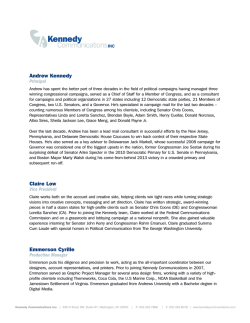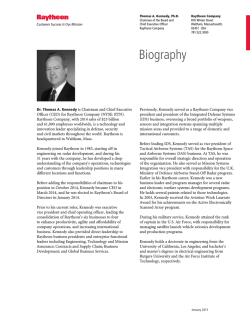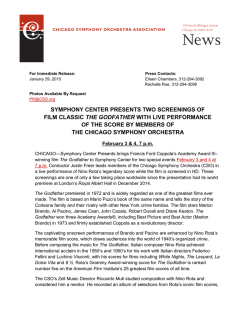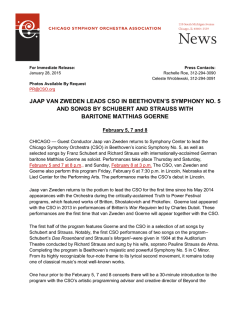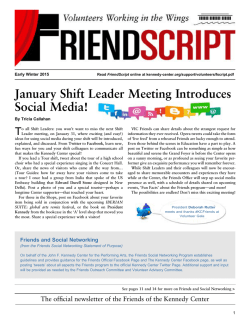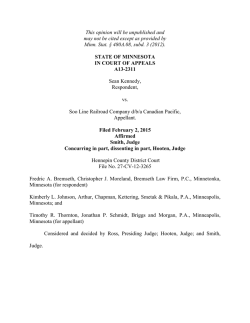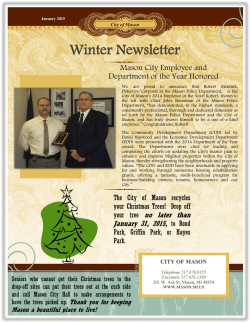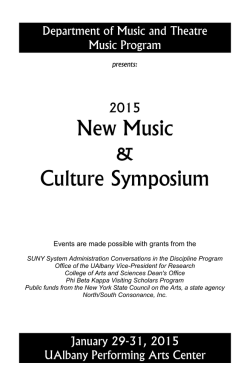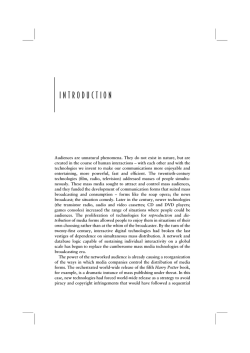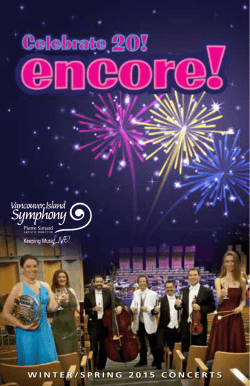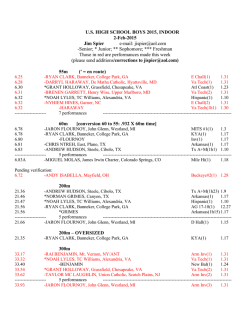
Mason Bates Composer-In-Residence
Press Release FOR IMMEDIATE RELEASE: January 28, 2015 The John F. Kennedy Center for the Performing Arts announces MASON BATES as its first COMPOSER-IN-RESIDENCE Three-year residency, beginning in the 2015-2016 season, will span across musical genres and include an innovative new music series (WASHINGTON)—The Kennedy Center today announced that composer Mason Bates will join the Center in the 2015-2016 season as its first Composer-In-Residence. During his three-year residency, Bates will compose music across artistic genres and curate a new contemporary music series. He will also advance initiatives that use technology to educate audiences and will encourage the inclusion of local artists and DJs in performances at the Kennedy Center. “The Kennedy Center’s astonishingly diverse programs played such a crucial role in my early education in Virginia, so it thrills me to join this great team as Composer-In-Residence,” said Mr. Bates. “With its rich variety of art forms, the Kennedy Center is the perfect place for new art to impact not only the surrounding communities, but the national conversation as well.” Mason Bates writes music that fuses innovative orchestral writing, imaginative narrative forms, the harmonies of jazz, and the rhythms of techno. His symphonic music has received widespread acclaim for its expanded palette of electronic sounds, and is championed by leading conductors such as Michael Tilson Thomas, Riccardo Muti, and Leonard Slatkin. He is the second most-performed living composer by symphony orchestras and was recently honored with the Heinz Award in the Arts and Humanities. Under the new vision of President Deborah F. Rutter, the Kennedy Center is re-imagining ways of presenting the arts in the 21st century through immersive audience engagement and ~ more ~ interdisciplinary programming. The artist’s creative vision will be at the center of the dialogue between the Kennedy Center and its patrons, allowing audiences to experience the vibrancy of the creative process more directly. “By presenting new art to audiences in new ways, Mason will help initiate a new era of creative programming here at the Kennedy Center,” said Ms. Rutter. “He will also be an incredible ambassador as we continue our efforts to bring a refined vision of the listening experience to a larger audience, both at the Center and in the greater Washington community. I have truly enjoyed working with Mason previously, and I think he will bring fresh perspective and great enthusiasm for live concert music to audiences in the Washington, D.C. region.” Planned Kennedy Center commissions over the course of Bates’s residency include works for the National Symphony Orchestra, Washington National Opera, the Fortas Chamber Music Concerts, and performances of contemporary dance. He will also be featured as a performer at many Kennedy Center performances across genres. The new contemporary music series will present the works of living composers using Bates’s signature re-imagining of the classical music experience. His innovative ideas for integrating traditional symphonic works with new music and performing them in alternative venues have attracted large and enthusiastic crowds to new music concerts throughout the United States and abroad. More information on Bates’s work as Composer-In-Residence—including new commissions, the contemporary music series, and other performances during the 2015-2016 season—will be announced at the Kennedy Center’s season announcement in March. ABOUT MASON BATES A contemporary composer grounded in both the fundamentals of classical music and electronica, Mason Bates tackles broad, creative themes, moving the orchestra into the digital age and dissolving the boundaries of traditional symphonic music. His award-winning compositions combine an expanded orchestral palette, often including electronic sounds with large-scale, imaginative narrative forms that incorporate topics ranging from earthquakes to energy. Frequently performed by orchestras large and small, his symphonic music has received widespread acclaim and is championed by leading conductors such as Michael Tilson Thomas, Riccardo Muti, and Leonard Slatkin. In 2012 he was awarded the Heinz Award in the Arts and Humanities, and in 2014 was named the second most-performed living composer by symphony orchestras. Mason Bates moves fluidly between two distinct musical worlds, with one foot in prestigious symphony halls and the other in late-night dance clubs, where he deejays. He brings 2 these two worlds together not only with his electro-acoustic compositions, but also through his efforts to introduce new music to new venues. His classical/club project, Mercury Soul, integrates classical performances into an evening of DJing in alternative spaces and has attracted large crowds to events created for the Chicago, San Francisco, and New World Symphonies. Bringing classical music to new audiences is a central part of Bates’ activities as a curator. With composer Anna Clyne, he has transformed the Chicago Symphony’s MusicNOW series into an imaginative concert experience, drawing huge audiences with cinematic program notes and immersive stagecraft. Bates currently serves as the Mead Composer-In-Residence with the Chicago Symphony Orchestra, which in 2012 performed his Alternative Energy under Riccardo Muti on the opening night of Carnegie Hall’s fall season. His Chicago residency concludes at the end of the 2014-2015 season. He also maintains deep relationships with the San Francisco Symphony, which recently completed a three-week Beethoven and Bates Festival; and the Pittsburgh Symphony Orchestra, where he is currently serving as Composer of the Year. He actively supports the music of his fellow composers through his programming of new music on the Chicago Symphony’s MusicNOW series and elsewhere. With the future in mind, he looks to continue expanding his musical contributions and explore composition in the realms of theater, opera, and film. Mason Bates was raised in neighboring Virginia, and his early musical education was shaped by frequent visits to the Kennedy Center. ABOUT THE JOHN F. KENNEDY CENTER FOR THE PERFORMING ARTS The John F. Kennedy Center for the Performing Arts is America’s living memorial to President Kennedy. Under the leadership of Chairman David M. Rubenstein, President Deborah F. Rutter, and Music Director Christoph Eschenbach, the nine theaters and stages of the nation’s busiest performing arts facility attract audiences and visitors totaling 3 million people annually; Centerrelated touring productions, television, and radio broadcasts welcome 40 million more. Opening its doors on September 8, 1971, the Center presents the greatest performances of music, dance, and theater; supports artists in the creation of new work; and serves the nation as a leader in arts education. With its artistic affiliates, the National Symphony Orchestra and Washington National Opera, the Center’s achievements as a commissioner, producer, and nurturer of developing artists have resulted in more than 300 theatrical productions, and dozens of new ballets, operas, and musical works. Each year, millions of people nationwide take part in innovative, inclusive, and effective education programs initiated by the Center, including school- and community-based residencies and consultancies; age-appropriate performances and events for young people; career development for young actors, dancers, singers, and instrumentalists; and professional learning opportunities for teachers, teaching artists, and school administrators. These programs have become models for communities across the country. The Center’s Ensuring the Arts for Any Given Child program works with selected local school districts and seeks to provide a comprehensive arts education to children K-8. The Center also has been at the forefront of making the performing arts accessible to persons with disabilities, highlighted by the work accomplished with its affiliate, VSA. As part of the Kennedy Center’s Performing Arts for Everyone outreach program, the Center stages more than 400 free performances of music, dance, and theater by artists from throughout the world each year on the Center’s main stages, and every evening at 6 p.m. on the Millennium Stage. The Rubenstein Arts Access Program expands the Center’s efforts to make the 3 arts accessible to children, young adults, and to people who have little or limited ability to attend and enjoy the performing arts, enabling audiences to engage in more ways, at more times, and in more places than ever before. For more information about the Kennedy Center, please visit www.kennedy-center.org Discover the Kennedy Center on social media: # # # PRESS CONTACT Michael Solomon (202) 416-8453 [email protected] 4
© Copyright 2026
